
"Knock Three Times" is a popular song credited simply to "Dawn". Tony Orlando was not named on the record. The actual singers were Tony Orlando, Toni Wine, and Linda November, prior to the creation of "Dawn" with Telma Hopkins and Joyce Vincent Wilson. The song was released as a single, which hit #1 on the Billboard Hot 100 in January 1971 and eventually sold six million copies. The song registered well at Adult Contemporary stations, reaching #2 on Billboard's "Easy Listening" survey. Outside the US, "Knock Three Times" also claimed the #1 spot on the UK Singles Chart.
"A Tear Fell" is a popular song. It was written by Eugene Randolph and Dorian Burton and released in 1956.
"Santa Looked a Lot Like Daddy" is a Christmas song co-written and recorded by Buck Owens. After its recording in 1965, the song has been covered by several country music artists, including Garth Brooks, Travis Tritt, and Brad Paisley.
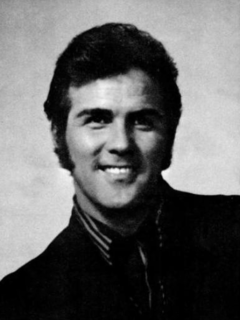
Billy Wayne "Crash" Craddock is an American country and rockabilly singer. He first gained popularity in Australia in the 1950s with a string of rockabilly hits, including the Australian number one hit's "Boom Boom Baby" and "One Last Kiss" in 1960 and 1961 respectively. Switching to country music, he gained popularity in United States in the 1970s with a string of top ten country hits, several of which were number one hits, including "Rub It In", "Broken Down in Tiny Pieces", and "Ruby Baby". Craddock is known to his fans as "The King Of Country Rock Music" and "Mr. Country Rock" for his uptempo rock-influenced style of country music.
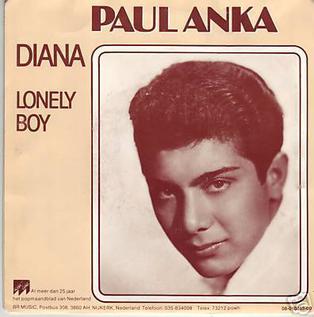
"Lonely Boy" is a song written and recorded by Paul Anka. Recorded in August 1958, "Lonely Boy" was released in 1959. Anka sang this song in the film Girls Town. When released as a single, it topped the Billboard Hot 100, becoming Anka's first song to do so, although he had earlier topped Billboard's Best Sellers in Stores chart with "Diana". Billboard ranked it as the No. 5 song for 1959.
"Have You Ever Been Lonely? " is a popular song with music by Peter De Rose and lyrics by Billy Hill, published in 1932. It has been recorded by many singers, becoming a standard.
"Ruby Baby" is a song written by Jerry Leiber and Mike Stoller. It was originally recorded by the Drifters. Their version was released on a single by Atlantic Records as catalog number 45 1089 in 1956. This original version peaked at No. 10 on the US R&B chart.
"Don't Be Angry" is a popular song written by Nappy Brown, Rose Marie McCoy, and Fred Mendelsohn and published in 1955. Brown released it in 1955, reaching No. 2 on the Billboard R&B charts. It also went to No. 25 on the US Best Seller list.

"Tell Me a Lie" is a song, composed by Mickey Buckins, Barbara Wyrick. Originally recorded by Lynn Anderson for her 1974 What a Man My Man Is album, it was released later that same year as a single by Sami Jo Cole, who took it to number 21 on both of the major U.S. pop charts. It also charted in Canada (#17). Cole's version was also an Adult Contemporary hit, reaching number 14 in the U.S. and number 27 in Canada.
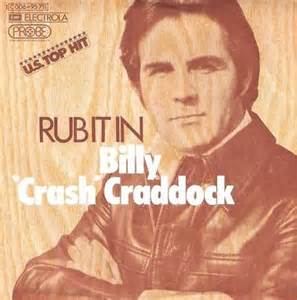
"Rub It In" is a song written and originally recorded by Layng Martine Jr., and credited as Layng Martine. His version, released on the Barnaby Records label, was produced by Ray Stevens and was a U.S. chart single in the fall of 1971, reaching number 65.
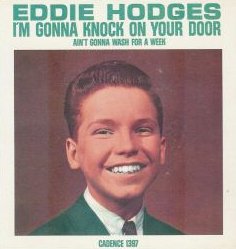
"I'm Gonna Knock on Your Door", written by Aaron Schroeder and Sid Wayne, is a song that was originally released by the Isley Brothers in 1959 and became a hit for teenage actor Eddie Hodges in 1961. It peaked at #12 at Billboard Hot 100.

Sings His Greatest Hits is a greatest hits collection by country singer Billy "Crash" Craddock. It was released in 1978 on ABC Records as AB-1078. It was reissued as MCA Records 663 in 1981. The album was re-released again on cassette only in 1995. The album has been called "a good summation of his peak years."
"Don't Destroy Me" is a rockabilly song written by Barry Mann and Joe Sharpiro and recorded by Billy "Crash" Craddock in 1959. "Don't Destroy Me" was his first hit song in the United States, where it stayed on the Billboard Hot 100 chart for one week at No. 94.
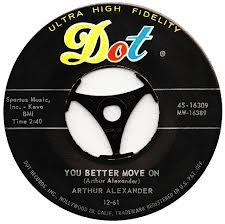
"You Better Move On" is a 1961 rhythm and blues song by Arthur Alexander. It reached number 24 on the Billboard Hot 100 in March 1962. Versions by Billy "Crash" Craddock and George Jones and Johnny Paycheck were hits on the Country charts.
"Broken Down in Tiny Pieces" is a song written by John Adrian., and recorded by American country singer Billy "Crash" Craddock, with Janie Fricke performing background vocals on the song. It was released in October 1976 as the first single from the album Crash. The song stayed at number one for one week and spend twelve weeks within the top 40.
"Funny How Time Slips Away" is a song written by Willie Nelson and first recorded by country singer Billy Walker. Walker's version peaked at number 23 on the Hot C&W Sides chart. The tune is slightly similar to "When Two Worlds Collide", which was written by Roger Miller and Bill Anderson.
"Have a Little Faith" is a song written by Billy Sherrill and Glenn Sutton, and recorded by American country music artist David Houston. It was released in February 1968 as the first single from the album Already It's Heaven. The song was Houston's fourth number one single on the country charts. The single stayed at number one for a single week and spent a total of thirteen weeks on the chart. "Have a Little Faith was a crossover hit peaking at #18 on Billboard's Easy Listening survey.
"Singing My Song" is a song recorded by American country music artist Tammy Wynette, who co-wrote the song with Billy Sherrill and Glenn Sutton. It was released in March 1969 as the first single from her compilation album Tammy's Greatest Hits. The song was Wynette's fifth number one on the country charts as a solo artist. The single spent two weeks at number one and a total of fourteen weeks on the charts.
"Making Believe" is a country music song written by Jimmy Work. Kitty Wells recorded a chart-topping version in 1955. The song is on many lists of all-time greatest country music songs and has been covered by scores of artists over the past fifty years, including Thorleifs, Bob Dylan, Johnny Cash, Don Gibson, Roy Acuff, Lefty Frizzell, Wanda Jackson, Connie Francis, Ray Charles, Anita Carter, Dolly Parton, Emmylou Harris, Merle Haggard, Ernest Tubb, Social Distortion, Skeeter Davis, The Haden Triplets, Social Distortion and Volbeat. The song is occasionally called "Makin' Believe".

You Lay So Easy on My Mind is the thirty-fourth studio album by American pop singer Andy Williams, released in November 1974 by Columbia Records. The idea for this LP was mentioned in an interview with Williams in the November 3, 1973, issue of Billboard magazine that emphasized his desire to move away from recording albums of Easy Listening covers of hits by other artists, noting that he was "planning an album to be cut in Nashville with Columbia's high-flying country-pop producer, Billy Sherrill." The article coincided with the release of his first attempt to shift directions, Solitaire, which performed poorly. A return to the Easy Listening hits formula, The Way We Were, followed in the spring of 1974 but failed to even chart, so this next attempt to eschew soft rock songs leaned heavily on Country hits.








